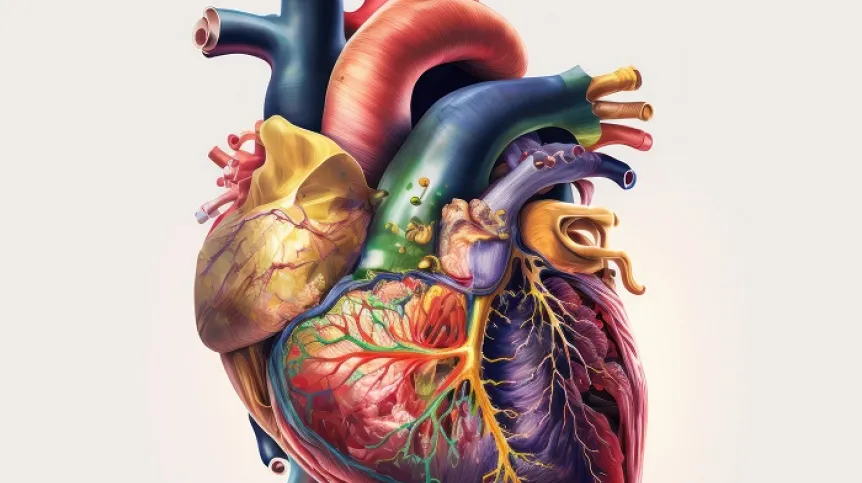
The discovery that the risk of ischaemic strokes is influenced by the left-sided septal pouch, which 50% of people have, is important, but it is not new, says its author, Professor Mateusz Hołda. His team published the most important information on the subject several years ago, but the research continues.
Professor Hołda teaches at the Department of Anatomy of the Jagiellonian University Medical College and is a resident physician at the Rapid Diagnostics Department of the John Paul II Specialist Hospital in Krakow. He was the youngest Polish scientist to be bestowed the title of Professor before the age of 30. He was the first in the country to defend his doctoral dissertation before completing his master's studies, and three years later, also as the youngest scientist in history, he obtained his habilitation. In 2013, he founded the international scientific team HEART (Heart Embryology and Anatomy Research Team), which specializes in research on the structure of the cardiovascular system. He is a winner of prestigious awards and the author of scientific articles published in the most respected journals.
As the researcher told PAP, while the discovery of the importance of the septal pouch is not new, it remains important. 'The media are now interested in this topic. We published the most important issues regarding the importance of the interatrial septum and the pouch located there for the risk of strokes 2-3 years ago. Of course, further research is still ongoing,’ Professor Hołda said.
The Polish research was inspired by foreign discoveries. 'It started with observing other studies. The first theory on this topic appeared in 2010. Scientists from the University of California Irvine Medical Center speculated that the pouch was a place with an increased thrombotic predisposition. Later, there were reports of further specific cases of strokes linked to the pouch. This prompted us to explore this topic,’ Hołda said.
The pouch itself is basically an anatomical variant of the structure of the septum between the atria. 'It is a natural element of the heart that resembles a small pocket. This structure, located on the interatrial septum, is closed on three sides and open on one side. In other words, it's a small glass filled with blood,’ Hołda said.
Precisely because it fills with blood, it can be dangerous, but only in some people. 'If blood circulation in the heart is disturbed, for example in the course of atrial fibrillation, blood may clot in this pouch. The clot can then easily travel through the mitral valve to the left ventricle, aorta, and then to smaller and smaller vessels, where it can cause an embolism,’ the cardiomorphologist said.
Only part of the population has this pouch. 'It can be found in 50 percent of people. We say that it is a variant of the anatomical structure of the heart. It is important that not everyone who has it is at particular risk of stroke. There are still other heart disorders that contribute, which together with pouch form a dangerous combination of risk factors leading to a stroke,’ Professor Hołda said.
The discovery may have implications for therapy. 'If someone has been diagnosed with atrial fibrillation, for example, the matter is clear - they will be treated with anticoagulants if the appropriate conditions are met. However, sometimes unexplained strokes occur in young, potentially healthy adults who have no other medical conditions. This is called a cryptogenic stroke. We have just concluded that the septal pocket may be one of the causes of such an event,’ explained Professor Hołda.
Methods of helping people at risk remain to be determined. 'We are thinking about closing this pouch, similarly to closing the patent foramen ovale. The pouch is actually an evolution of the foramen ovale canal, which gradually grows over and forms this pouch. So we could use similar procedures. Destruction of the pouch is also considered, e.g. using ablation - similarly to what is done in arrhythmia. It may also be advisable to implement anticoagulant treatment to prevent clots from forming in the pouch. For now, however, we do not have methods for destroying or closing the pouch, or even a consensus on the use of pharmacotherapy,’ the scientist said.
If someone is at risk of stroke, there is a lot they can do to reduce it. 'Cardiac diseases are mainly a civilization problem and they largely depend on personal choices. For example, you can reduce the risk of atrial fibrillation, which increases the risk of stroke. A healthy lifestyle is important, and in case of problems, regular visits to a cardiologist and appropriate tests, including routine ones,’ Professor Hołda said.
PAP - Science in Poland reported on Professor Hołda's discoveries in 2019. The scientist also talked about his plans and interests, not only scientific ones, in an interview with PAP in 2022, after receiving the title of professor. (PAP)
Marek Matacz
mat/ bar/ kap/
tr. RL













